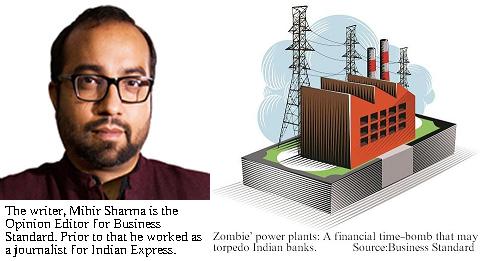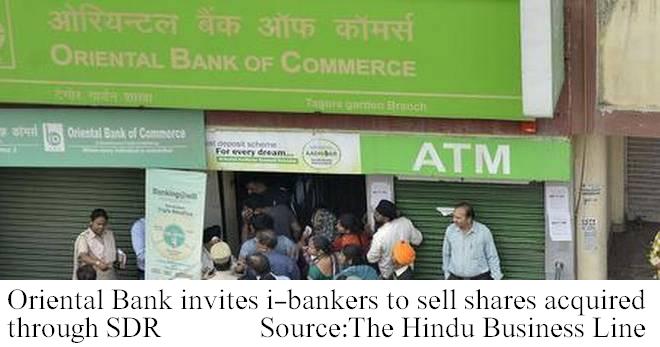|
||||||||
|
|
|
2018-08-16 ArtNo.46327
◆'Zombie' power plants: A financial time-bomb that may torpedo Indian banks
 【New Delhi】Government seems intent on abandoning good ideas for dealing with the country's banking crisis and encouraging bad ones. The latest terrible proposal for dealing with the bad loans weighing down India's state-owned banks, which control more than two-thirds of deposits, is to create a "bad bank" -- an asset-management company that would take stressed assets off their balance sheets. Naturally, the scheme emerged from a committee made up of the heads of India's nationalized banks. Ownership of the new company would be shared between banks and private investors. It would have to raise at least Rs 1 trillion (about $14.5 billion) for an alternative investment fund from various pools of capital in the private sector. Why so much? Because the company will have to act as a market maker for stressed assets that nobody wants, picking up 15 percent of an agreed-upon floor price. This is the real issue. There are already quite a few private-sector asset-management companies lurking around now that India has finally instituted a real insolvency code. The problem isn't that they don't have enough money, it's that not enough of the stressed assets being put on sale look good enough to buy. The most intractable bad loans, the ones the bad bank is meant to deal with, are concentrated in one sector: power. In particular, Indian thermal plants are struggling. A parliamentary subcommittee estimated earlier this year that 34,000 megawatts-worth of capacity is in trouble. Either nobody has signed up to buy power from these plants, rendering them unprofitable, or they don't have access to subsidized coal. An industry association thinks that the real number is closer to 50,000 megawatts, in the same ballpark as all the capacity added in the past five years of feverish plant-building. Others have provided even higher estimates. This is a significant proportion of India's total power generation capacity -- and, at perhaps Rs 4 trillion, a sizeable fraction of the banks' balance sheets. In India, renewable energy now looks competitive with "zombie" thermal power plants in terms of cost, while new plants require government subsidies and favorable administrative decisions that bureaucrats are reluctant to provide. In addition, provincial power utilities are chronically in the red because of their inability to force end-users of electricity to pay up. However, the transition to a lower-carbon economy is a reality, even for countries like India where coal will still be the bedrock of power generation for decades to come and even if renewable energy is still unreliable for base-load power. Given that this transition is real and happening, policymakers around the world must understand that carbon-based assets are a financial time-bomb. In India, they look like they might torpedo the banking sector; elsewhere, they will pose other major threats to financial stability. It's time for regulators to get serious about the knock-on effects of the world's fight against climate change. ○Oriental Bank invites i-bankers to sell shares acquired through SDR  【New Delhi】In a bid to liquidate equity shares allotted to it under restructuring package, Oriental Bank of Commerce is planning to rope in an advisor to assess its equity stake in 30 to 40 listed as well as unlisted companies acquired under the package and advise it on company-wise feasibility of stake sale. In FY2018, the public sector bank invoked Strategic Debt Restructuring (SDR) as per Reserve Bank of India guidelines and acquired shares (through conversion of its exposure into equity) in companies such as Chennai Network Infrastructure Ltd (CNIL), GTL Infrastructure Ltd, Supreme Ahmednagar Karmala Tembhumi Tollways Pvt Ltd, Ballarpur Industries Ltd, Athena Chhattisgarh Power Ltd, and Aman Hospitality Private Ltd pursuant to invocation of SDR. The Bank has invited bids from Merchant Banker(s)/Insolvency Professional(s)/ Asset Restructuring Company(s)/Financial Consultancy Firm to advise it on the stake sale. With the RBI bringing in the revised framework for resolution of stressed assets on February 12, 2018, all the extant instructions on resolution of stressed assets, including SDR, have been withdrawn. 【News source】 'Zombie' power plants: A financial time-bomb that may torpedo Indian banks What this banking crisis really is, and how govt has missed what matters most Oriental Bank invites i-bankers to sell shares acquired through SDR ○One world:The aim of SEAnews |
|
[Your Comments / Unsubscribe]/[您的意见/退订]/[ご意見/配信停止]
Please do not directly reply to the e-mail address which is used for delivering the newsletter. 请别用递送新闻的邮件地址而直接回信。 メールをお届けした送信専用アドレスには返信しないで下さい。 |